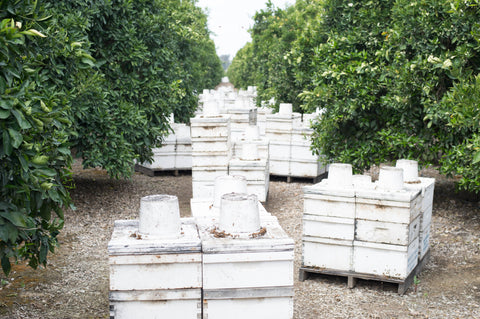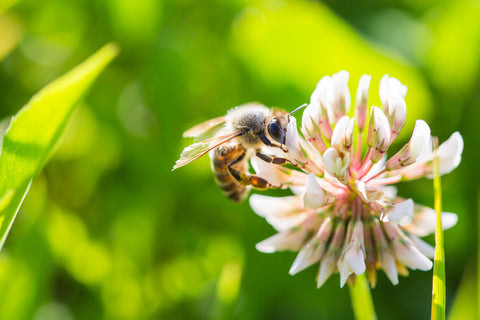Unlike many insects and mammals, bees don’t hibernate when it gets cold. In fact, they do the opposite. For the bees, winter means gathering in a dense cluster inside of and around the exposed edges of their hive and eating the fruits of their labor, honey. Besides just eating the bees exercise like mad to keep warm in the winter chill. When the temperature drops below about 50 degrees, thousands of bees crowd inside their hive and begin working their flight muscles in a tight, clenching and unclenching routine. So many moving bodies generate a great deal of heat. It also creates moving air currents inside the hive that serve to expel carbon dioxide and moisture. But mainly, it keeps the queen warm.
As it starts to get into the winter season here in Idaho, the home of Rocky Mountain Honey Co, our keepers prepare to move our hives to California for the winter. There in California the weather is much more preferable for our bees during the winter months. During this time the bees are placed in many orange groves across southern and mid California to pollinate the orange groves. Through this process not only do the orange groves provide us a delicious fruit but they also give us some delightful tasting honey through the nectar of its beautiful orange blossoms.
Honey bees look for flower nectar and pollen to feed on and, depending on the time of year and region, different sources may be available. Citrus blossoms are one such source of delicious nectar and pollen that honey bees feed on and store to live off during winter. Orange blossom honey is a variety of monofloral honey produced when bees collect nectar and pollen from orange tree flowers and, possibly, other citrus species in bloom at the same time and located in the same region. If there aren’t any other flowering plants except for orange trees in the area and the nectar source is plentiful, the bees will collect everything they need from this one source and produce an exclusively monofloral honey.
Generally, our beekeepers chose where to relocate their bees very carefully and take into account various factors, depending on the type of honey they want their bees to produce. So, if the aim is for them to make orange blossom honey, the bees will be moved to orange tree orchards that should offer a plentiful supply of nectar for a set period of time, making sure there is no competition from other hives or floral sources.
This particular variety has a somewhat pale, light golden color. The purer the honey (very little or no contamination from other floral sources), the lighter its color should be.
Orange blossom honey falls on the sweeter end of the honey spectrum. This variety has a somewhat subtle, citrussy smell and an overall fresh aroma. It tastes surprisingly sweet and has a delicate, slightly acidic flavor, with a taste reminiscent of citrus fruit.
If you enjoy eating orange blossom honey for its unique and delicate flavors, you will be pleased to know that it's more than just a sweet treat. Orange blossom honey, like many other honey varieties, has medicinal properties that support human health and well-being and can be used both internally and externally.
What I find most interesting is the fact that Orange Blossom honey contains several important antioxidants. All honey varieties contain antioxidants, different monofloral honey varieties have different levels and types of antioxidants and will affect your body in different ways. Let’s take a look at what Orange Blossom honey has to offer.
High in Antioxidants
Orange blossom honey provides a wide variety of natural antioxidants to the diet. Orange blossom honey contains quercetin, hesperidin, luteolin, kaempferol, galanin, naringenin and isorhamnetin. These types of antioxidants provide the consumer with anti-inflammatory, anti-allergy, anti-cancer and immune supporting effects in the body. The antioxidants in orange blossom honey may help to protect against free radical damage and reduce your risk of chronic illnesses.
Antimicrobial Properties
Orange blossom honey boasts strong natural antimicrobial properties that recommend it for a variety of uses, from wound healing to improving the appearance of acne and acne scars and treating respiratory tract infections by reducing bacterial load.
Soothing on the Stomach
The soothing action of orange blossom honey and other varieties is attributed to both the thick, viscous consistency of the honey and its antimicrobial action. The particular consistency of the honey makes it stick to mucous membranes, forming a protective coating that shields from harmful elements and allows the mucous membranes to heal, reducing inflammation and irritation at the same time.
Great for Sore Throat
Orange blossom honey is great for a sore throat because it helps calm irritation, reduce pain and discomfort and relieve cough. With its viscous consistency, it sticks to the throat lining, forming a protective coating that allows the mucous lining to heal. Moreover, its natural antimicrobial action reduces bacterial load, making it a good natural remedy for respiratory tract infections of a bacterial nature.
Nutritious Food
All honey varieties are actually quite nourishing, providing essential nutrients such as simple carbohydrates (principally fructose, glucose and other natural sugars), but also trace amounts of amino acids and minerals such as potassium, calcium, copper, zinc, manganese, magnesium and sodium, as well as polyphenolic compounds. Considering its properties, orange blossom honey is a great substitute for refined sugar, candy or artificial sweeteners.
Pick up a jar today, you won't be disappointed!



